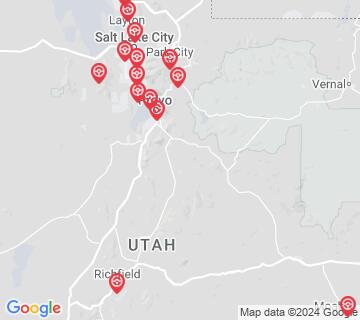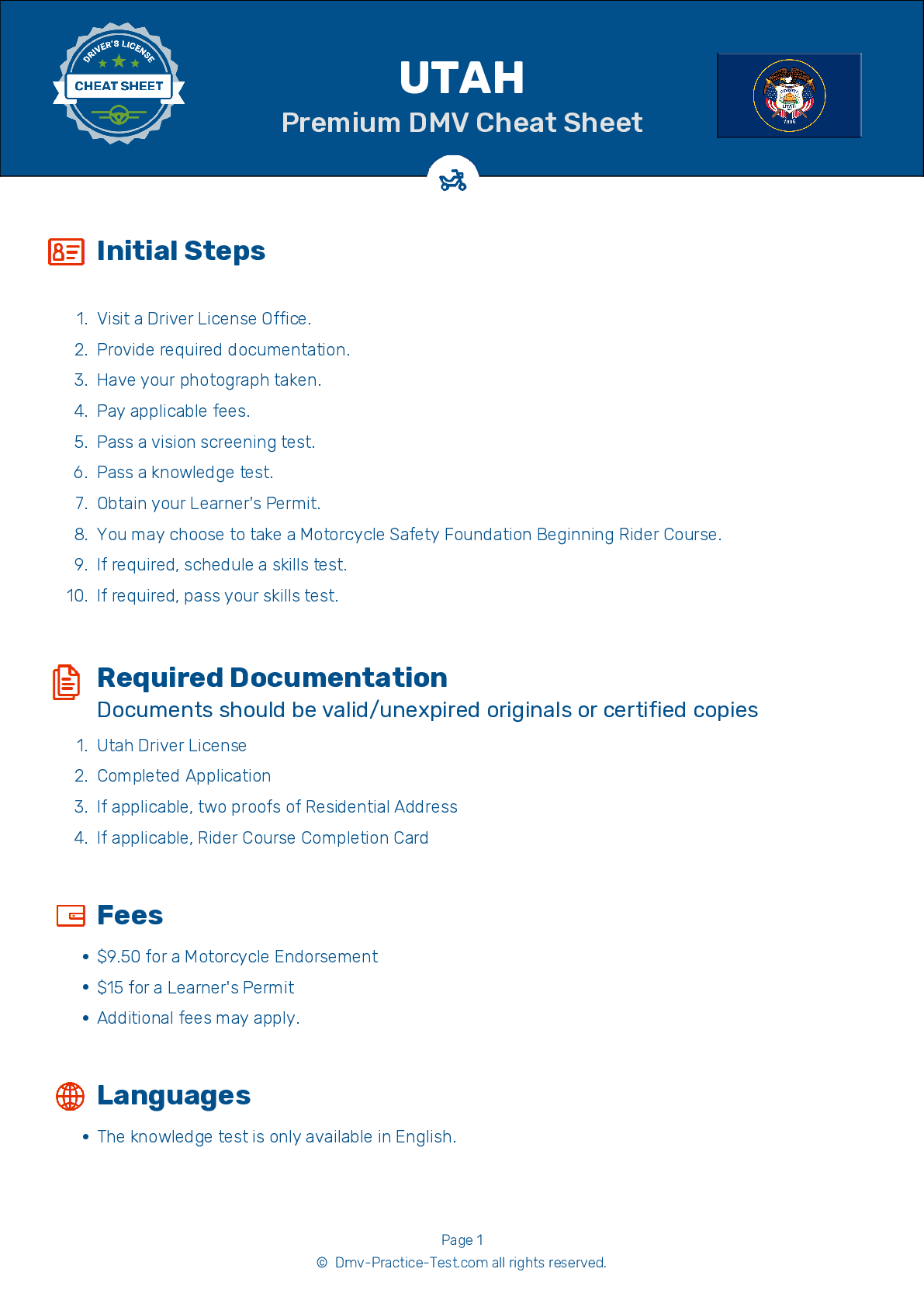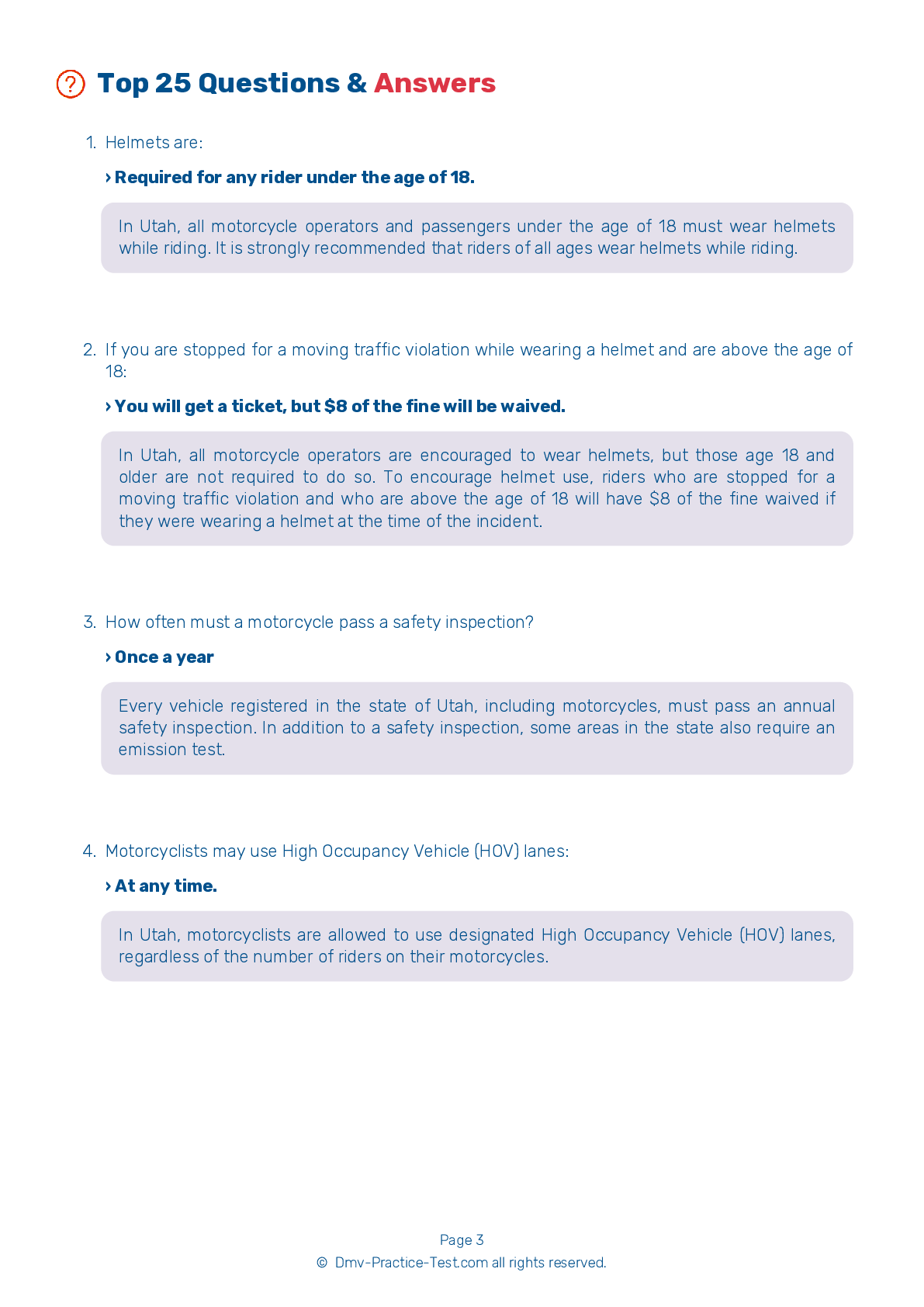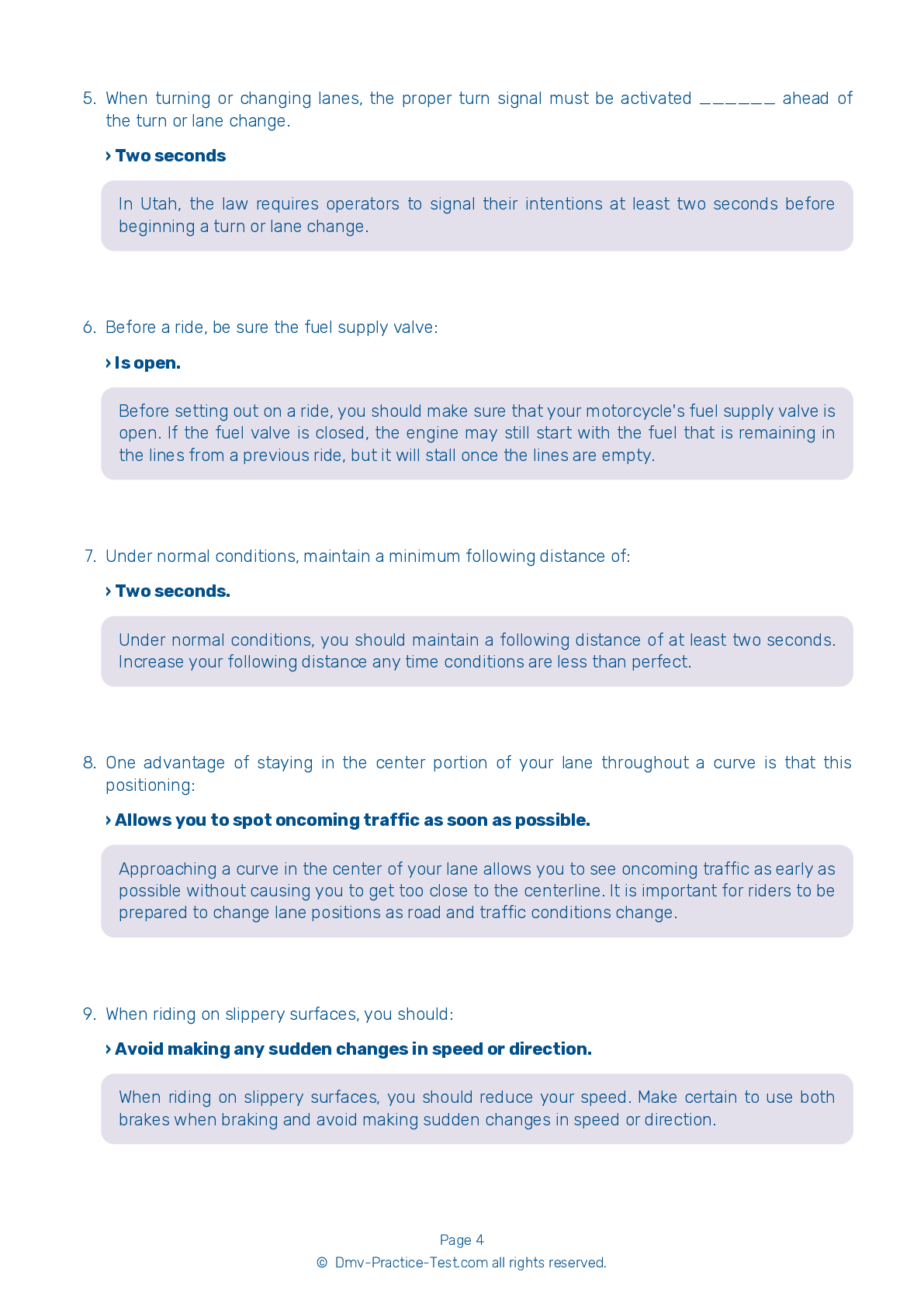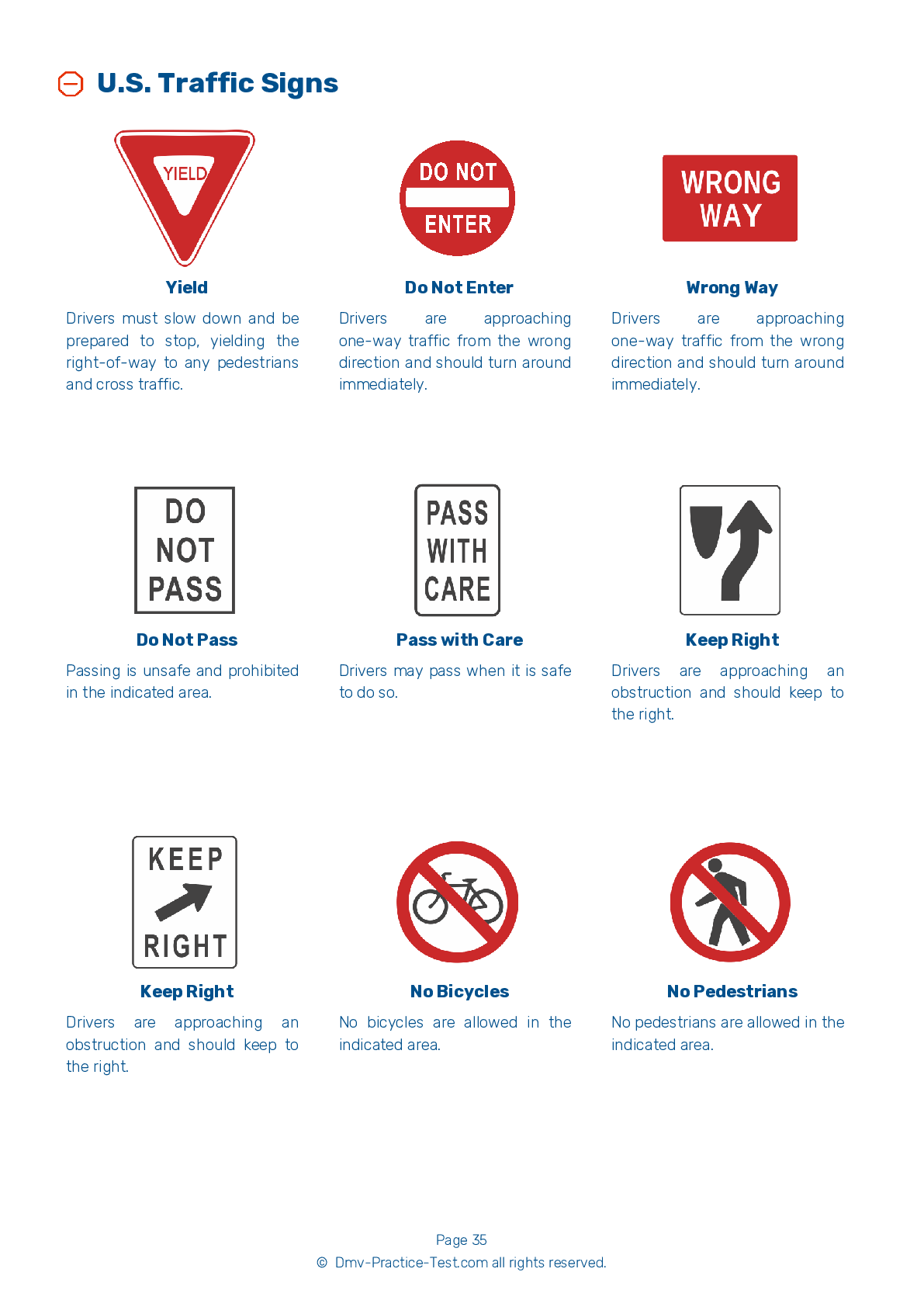DMV Permit Test #8
Motorcycle Test | License UT 2026 | FREE Online Practice! #8 Page 4 of 4
Take this FREE motorcycle test (license in UT 2026) to check your knowledge of the road rules. To improve your results, download a motorcycle handbook online, study theory, and practice for free on our website. Still worried about how to get a motorcycle license in Utah in 2026? Check our website for more sample tests, train as much as possible, and boost your grades!
25
20
16
19 . In general, when parked on the road, a motorcycle should be:
Parallel to the curb.
If parking in a parallel parking space next to a curb, it is generally best to position the motorcycle at an angle with the rear wheel to the curb. It should be noted that some cities have ordinances that require motorcycles to be parked parallel to the curb.
20 . When riding a three-wheeled motorcycle, a rider should:
Ride on one wheel whenever possible.
When operating a three-wheeled motorcycle, it is possible to have only two wheels in contact with the ground. This condition occurs whenever enough weight is transferred outside of what are known as “tip-over lines.”
21 . When selecting footwear, you should choose:
Shoes that are made from flimsy materials.
When riding, wear boots or shoes that are high and sturdy enough to cover and support your ankles. Heels should be short so they don't catch on rough surfaces. Laces should be tucked in so they can't catch onto the moving parts of the motorcycle.
22 . Scan the road ______ ahead of your motorcycle.
Three seconds
Search your path of travel at least 12 seconds ahead of your motorcycle. This will allow you to see and react to hazards before meeting them.
23 . To be effective, an eye or face shield should be all of the following, except:
Airtight.
To be effective, eye protection and face shields must be free of scratches; be resistant to penetration; give a clear view to either side; fasten securely; permit air to pass through; and permit enough room for eyeglasses or sunglasses to be worn underneath.
24 . When riding over rough surfaces, you should:
Ride without a helmet as the helmet could become loose and cover your face.
When riding over a rough surface, hold onto the handgrips firmly to ensure that you will maintain directional control over your motorcycle.
25 . When does an Anti-Lock Braking System (ABS) begin operating?
When pressure is released from both the front and rear brakes.
Some motorcycles are equipped with an Anti-Lock Braking System (ABS). ABS is designed to prevent skidding and wheel lock-up when motorcyclists are stopping in straight-line, panic situations. ABS operates when maximum pressure is applied to both the front and rear brake controls. If electronic sensors detect the possibility of a wheel lock, brake hydraulic pressure is released then re-applied to maintain maximum braking effectiveness.
Search the best driving school in your neighbourhood
2026 Utah | Frequently Asked Questions
To acquire a motorcycle license in Utah, you must first obtain a motorcycle learner's permit. This involves passing a written test. After practicing with your permit, you can take the road skills test to get your motorcycle license. Alternatively, completion of a Motorcycle Safety Foundation course can waive the road test. You must be at least 16 years old to apply.
In Utah, the minimum age to obtain a motorcycle endorsement is 16 years old. However, if you are under 19 years old, you must first hold a motorcycle learner's permit for two months before you can get a motorcycle endorsement on your driver's license.
Yes, in Utah, you need a dedicated motorcycle endorsement on your driver's license to legally operate a motorcycle. This requires passing a knowledge test and a skills test. If you don't already have a regular driver's license, you'll need to get that first before applying for the motorcycle endorsement.
To apply for a motorcycle driver's license in Utah, you'll need a few key documents: proof of identity (like a birth certificate or passport), proof of Social Security number, and two proofs of Utah residency. If you're under 18, you'll also need a parental consent form. You must also provide proof of driver education if you're under 19.
Yes, to obtain a motorcycle license in Utah, you are required to pass a written exam. This test assesses your knowledge of motorcycle operation, safety rules, and traffic laws. However, you can substitute the written test by successfully completing an approved motorcycle rider training course.
The motorcycle written test in Utah covers various topics including traffic rules, road signs, safe riding techniques, and handling difficult situations. It also includes questions about motorcycle-specific laws in Utah such as helmet use, lane sharing, and carrying passengers or cargo. The test is designed to assess your knowledge and understanding of safe motorcycle operation.
Yes, in Utah, you can substitute the written test with a state-approved Motorcycle Rider Education course. Upon successful completion, you'll receive a certificate which you can present at the Driver License Division. This will waive the written test, but you still need to pass the skills test to get your motorcycle endorsement.
To enroll in a motorcycle training course in Utah, you need to find a Motorcycle Safety Foundation (MSF) approved course. You can do this online or by calling local driving schools. Once you've chosen a course, register and pay any necessary fees. Attend all classes and successfully complete the course to receive your certificate, which can be used for license endorsement.
No, you do not need to own your own motorcycle to take the license test in Utah. You can borrow a motorcycle as long as it's registered, insured, and street-legal. The important thing is that you're comfortable and familiar with the bike. Remember to bring a DOT-compliant helmet for the test.
Yes, you can use a friend's motorcycle for the driver's license evaluation in Utah. However, the motorcycle must be street-legal, registered, and insured. You will also need to bring a helmet that complies with DOT standards. Remember to ensure you're comfortable and familiar with the bike before the test.
Yes, in Utah, the motorcycle driving exam tests specific handling skills. These include starting and stopping, turning and swerving, quick stops and obstacles, speed and gear adjustments. The test also evaluates your ability to balance the motorcycle at low speeds. These skills ensure that you can handle a motorcycle safely under various traffic conditions.
Yes, Utah imposes certain restrictions on new motorcycle drivers. For those under 19 years old, they must hold a motorcycle learner's permit for two months before getting a motorcycle endorsement. They also need to complete a state-approved Motorcycle Rider Education course. After receiving the endorsement, there aren't specific limitations but safe riding practices are always encouraged.
Yes, your Utah motorcycle license permits you to ride a motorcycle out of state. All U.S. states have reciprocity agreements, recognizing licenses issued by other states. However, while riding in other states, you must adhere to their specific motorcycle laws and regulations, which may differ from those in Utah.
In Utah, the law requires all motorcycle riders and passengers under the age of 21 to wear a helmet. However, those aged 21 and over are not legally required to wear a helmet, although it is strongly recommended for safety reasons. Helmets must meet the safety standards set by the U.S. Department of Transportation.
In Utah, there are two types of motorcycle licenses: motorcycle endorsement and motorcycle-only license. The motorcycle endorsement can be added to a regular driver's license, while the motorcycle-only license is for individuals who only want to operate a motorcycle. Both require passing a knowledge and skills test.
Yes, you can add supplementary endorsements to your motorcycle license in Utah. These endorsements allow you to operate additional types of vehicles. For instance, adding a "Passenger" endorsement lets you carry passengers on your motorcycle. To add an endorsement, you're required to pass additional written and skills tests and pay the applicable fees.
Yes, Utah's Department of Motor Vehicles (DMV) offers the motorcycle license test in multiple languages. However, it's recommended to contact your local DMV office beforehand to confirm the availability of your preferred language. Regardless of the language you choose, you need to demonstrate a solid understanding of traffic laws and road signs.
An effective strategy to prepare for the motorcycle license test in Utah includes studying the Utah Motorcycle Operator Manual thoroughly. This guide covers all the information you'll need. Additionally, taking online practice tests can be very beneficial. They simulate the actual test environment and help you familiarize yourself with the format and type of questions asked.
Yes, in Utah, the motorcycle written exam is offered in several languages other than English. However, it is recommended to contact the nearest DMV office to confirm the availability of the language you prefer. Remember, no matter the language, you must demonstrate a thorough understanding of road signs and traffic laws.
If you don't pass the motorcycle written test in Utah, you are allowed to retake it. However, you must wait for one day before you can retake the test. It's recommended to study the motorcycle handbook thoroughly before attempting again to increase your chances of passing.
